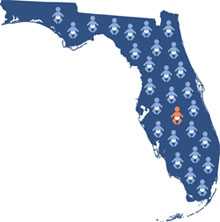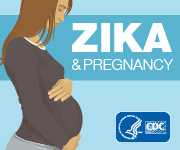Birth Defects Tracking in Florida
Florida Birth Defects Registry

1 in 28 babies born in Florida has a major birth defect.
The Florida Birth Defects Registry (FBDR) is essential for understanding the impact of birth defects in the state. The program is responsible for collecting, analyzing, and sharing information about birth defects in Florida. They use data for prevention activities, conducting studies, and helping families whose babies need services.
Common. Costly. Critical.
- Of the more than 210,000 babies born in Florida each year, 1 in 28 will be diagnosed with a major birth defect before their first birthday.
- Birth defects are costly – hospital costs for the treatment of birth defects are more than $2.5 billion each year in the United States.
- Babies born with a birth defect are more likely to die before their first birthday, compared to babies born without a birth defect.

About the Program
The FBDR was established in 1998 in response to community concerns about exposures in the environment and the risk for poor pregnancy outcomes, including birth defects. The registry collects information on all babies born with a birth defect in Florida, which is important for understanding the impact of these conditions in the state. The FBDR monitors about 210,000 babies born annually and is one of 14 birth defects programs that receive a grant funded by CDC’s National Center on Birth Defects and Developmental Disabilities.
The FBDR works with other departmental programs and with local, state and federal agencies, and organizations to prevent birth defects and to reduce their burden on Florida’s infants, families, and systems of care. Partners include the March of Dimes, Healthy Start Coalitions, University of South Florida and other universities, hospitals, healthcare providers, and child health advocates. The FBDR is operated by the Florida Department of Health, Division of Disease Control and Health Protection, Bureau of Epidemiology.
The FBDR works to:
- Collect and analyze information on babies born with a birth defect to identify trends over time and potential causes
- Respond to community concerns about potential clusters (meaning more babies are born with a certain birth defect in a certain area or over a certain time period than would be expected)
- Design prevention programs
- Research the causes and public health impact of birth defects
- Educate the community, healthcare providers, and service agencies about birth defects
Program in Action
- Educates stakeholders about birth defects in Florida: The FBDR developed state, regional and county data profiles with local information about the occurrence of birth defects for use by health policy leaders and community-based organizations serving affected families. New efforts include designing condition-specific fact sheets, like the Down syndrome fact sheet, that provide useful information to assist families seeking services for their children.
-
Promotes folic acid: Moving data to public health action is an important aspect of the FBDR. One example is promoting the importance of getting folic acid, a B vitamin, prior to and early in pregnancy to prevent neural tube defects.
- The program has developed folic acid educational materials and distributed multivitamins to minority and underserved women in an effort to raise awareness about folic acid and encourage women to consume folic acid daily.
- In partnership with the Florida Folic Acid Coalition and the University of Florida, the FBDR developed an interactive web program to educate women about making healthy food choices, called “Folic Acid Every Day”. The program allows women to plan meals using a dinner plate and then calculates the amount of folic acid in the meals as a way to increase daily folic acid intake.
- Health promotion activities combined with folic acid fortification of our nation’s food supply have contributed to a decrease in the number of babies born with neural tube defects. The FBDR has documented a decrease of spina bifida in Florida from 92 cases in 1999 to 60 cases in 2010. Estimated lifetime costs for caring for an infant with spina bifida are $636,000. The modest investment to prevent neural tube defects in Florida since 1999 has saved families, the healthcare system, and the state more than $20 million.
Making a Difference
The FBDR services are having an impact on families in Florida.
“When I was pregnant my doctor told me my baby would be born with spina bifida. I contacted the Florida Birth Defects Registry and they helped me understand how this condition would affect our baby and our family. It was so comforting to talk with someone who cared about me and my baby and who could tell me about this condition. “
–A Florida Mom

More Information
For more information about the Florida Birth Defects Registry, visit their website, email fbdr@flhealth.gov, or call (850) 245-4401.
- Page last reviewed: June 12, 2017
- Page last updated: June 20, 2017
- Content source:



 ShareCompartir
ShareCompartir